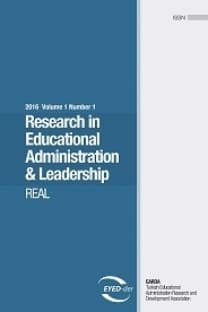The Effects of Regulations on Private School Choice Program Participation: Experimental Evidence from the United States
The Effects of Regulations on Private School Choice Program Participation: Experimental Evidence from the United States
private school, school choice regulation, survey experiment, school vouchers, school supply,
___
- Abdulkadiroğlu, A., Pathak, P. A., & Walters, C. R. (2018). Free to choose: can school choice reduce student achievement? American Economic Journal: Applied Economics, 10(1), 175-206.
- American Federation of Teachers (n.d.). Private school vouchers don’t help kids. https://www.aft.org/private-school-vouchers-dont-help-kids
- Austin, M. J. (2015). Schools’ responses to voucher policy: Participation decisions and early implementation experiences in the Indiana Choice Scholarship Program. Journal of School Choice, 9(3), 354-379.
- Austin, M. (2019). Organizational and social costs of schools' participation in a voucher program. In M. Berends, R. J. Waddington, & J. Schoenig (Eds.), School choice at the crossroads research perspectives (pp. 30-51). New York City, NY: Routledge.
- Barnum, M. 2017. To Test or Not to Test: As Tax Credit Scholarships Expand, Questions About Accountability and Outcomes. The 74 Million. https://www.the74million.org/article/to-test-or-not-to-test-as-tax-credit-scholarships-expand-questions-about-accountability-and-outcomes/
- Bedrick, J. (2016). The folly of overregulating school choice. Education Next. Retrieved from https://www.educationnext.org/the-folly-of-overregulating-school-choice/
- Bettinger, E., Kremer, M., Kugler, M., Medina, C., Posso, C., & Saavedra, J. E. (2019). School Vouchers, Labor Markets and Vocational Education. Borradores de Economía. Retrieved from http://banrep.gov.co/en/school-vouchers-labor-markets-and-vocational-education
- Burke, L. M. (2016). Avoiding the “inexorable push toward homogenization” in school choice: Education savings accounts as hedges against institutional isomorphism. The Journal of School Choice, 10(4), 560-578.
- Cheng, A., Henderson, M., Peterson, P.E., and M.R. West (2019). Public Support Climbs for Teacher Pay, School Expenditures, Charter Schools, and Universal Vouchers: Results from the 2018 EdNext Poll. Education Next, Winter, 8-26.
- DeAngelis, C. A. (2020). Regulatory compliance costs and private school participation in voucher programs. Journal of School Choice, 14(1), 95-121.
- DeAngelis, C. A., & Burke, L. M. (2017). Does regulation induce homogenisation? An analysis of three voucher programmes in the United States. Educational Research and Evaluation, 23(7-8), 311-327.
- DeAngelis, C. A., & Burke, L. M. (2019). Does regulation reduce specialization? Examining the impact of regulations on private schools of choice in five locations. EdChoice Working Paper No. 2019-1. Retrieved from https://www.edchoice.org/research/does-regulation-reduce-specialization/
- DeAngelis, C. A., Burke, L. M., & Wolf, P. J. (2019). The effects of regulations on private school choice program participation: Experimental evidence from Florida. Social Science Quarterly, 100(6), 2316-36. DOI: 10.1111/ssqu.12689
- DeAngelis, C. A., Burke, L. M., & Wolf, P. J. (2020). When Being Regulated is a Choice: The Impact of Government Policies on Private School Participation in Voucher Programs. Journal of School Choice.
- DeAngelis, C. A., & Dills, A. K. (2019). Is School Choice a “Trojan Horse?” The Effects of School Choice Laws on Homeschool Prevalence. Peabody Journal of Education, 94(3), 342-354.
- DeAngelis, C. A., & Hoarty, B. (2018). Who participates? An analysis of school participation decisions in two voucher programs in the United States. Cato Institute Policy Analysis No. 848.
- EdChoice (2023) The ABCs of School Choice: The Comprehensive Guide to Every Private School Choice Program in America. Available: https://www.edchoice.org/research-library/?report=the-abcs-of-school-choice#report
- Education Commission of the States (ECS). (2021) 50-State Comparison: Voucher Amounts. March. Accessed 9/14/2022 from: https://reports.ecs.org/comparisons/vouchers-06
- Egalite, A.J., Stallings, D.T., Dinehart, T., Meneses, F., Singh, L., & Whalen, V. (2018). School leaders’ voices: Private school leaders’ perspectives on the North Carolina Opportunity Scholarship Program, 2018 Update. OS Evaluation Report #6. Retrieved from https://ced.ncsu.edu/elphd/wp-content/uploads/sites/2/2018/10/School-Leaders-Voices.pdf
- Harris, D. (2015). The reform debate, part II: The difference between charter and voucher schools. Education Week. Retrieved from https://blogs.edweek.org/edweek/urban_education_lessons_from_new_orleans/2015/11/the_reform_family_debate_part_ii_regulation_affects_charter_schools_and_voucher_schools_differently.html
- Hess, F. M. (2010). Does school choice “work”. National Affairs, 5(1), 35–53.
- Lee, M. H., Mills, J. N., & Wolf, P. J. (2020). Heterogeneous Achievement Impacts across Schools in the Louisiana Scholarship Program. Journal of School Choice, 14(2), 228-253.
- McShane, M. Q. (2018). Rethinking regulation: Overseeing performance in a diversifying educational ecosystem. EdChoice. National Center of Education Statistics (NCES) (2021) Digest of Education Statistics Table 235.10. https://nces.ed.gov/programs/dige st/d21/tables/dt21_235.10.asp?current=yes
- Parents’ Campaign Research & Education Fund (2017, November 30). Vouchers do not guarantee admission to private schools. https://tpcref.org/vouchers-do-not-guarantee-admission-to-private-schools/
- Prothero, Arianna. (2017). ‘There is no oversight’: Private school vouchers can leave parents on their own. Education Week, November 14. https://www.edweek.org/policy-politics/there-is-no-oversight-private-school-vouchers-can-leave-parents-on-their-own/2017/11
- Sánchez, C. (2018). Understanding school competition under voucher regimes. Retrieved from http://econweb.umd.edu/~sanchez/files/csanchez_jmp.pdf
- Smart, J. C. (1988). College Influences on Graduates’ Income Levels. Research in Higher Education, 29(1), 41–59. http://www.jstor.org/stable/40195878
- Stuit, D., & Doan, S. (2013). School choice regulations: Red tape or red herring? Washington, D.C.: Thomas B. Fordham Institute.
- Sude, Y., DeAngelis, C. A., & Wolf, P. J. (2018). Supplying choice: An analysis of school participation decisions in voucher programs in Washington, DC, Indiana, and Louisiana. Journal of School Choice, 12(1), 8-33.
- Zhang, L. (2005). Do Measures of College Quality Matter? The Effect of College Quality on Graduates' Earnings. The Review of Higher Education, 28(4), 571-596.
- Yayın Aralığı: Yılda 4 Sayı
- Yayıncı: Dokuz Eylül Üniversitesi
Mary GAROFALO, Matthew GRAZİANO
Sandro TABATADZE, Salome DUNDUA
Education in Emergency: Lessons Learned About School Management Practices and Digital Technologies
Angelica MONTEİRO, Carlinda LEİTE, Marcelo COPPİ, Isabel FİALHO, Marília CİD
Veysel OKÇU, İnan AY, Mehmet SEVGİ, Cihangir BURUL
Paulo VOLANTE, Magdalena MÜLLER, Alvaro SALİNAS, Xiu CRAVENS
